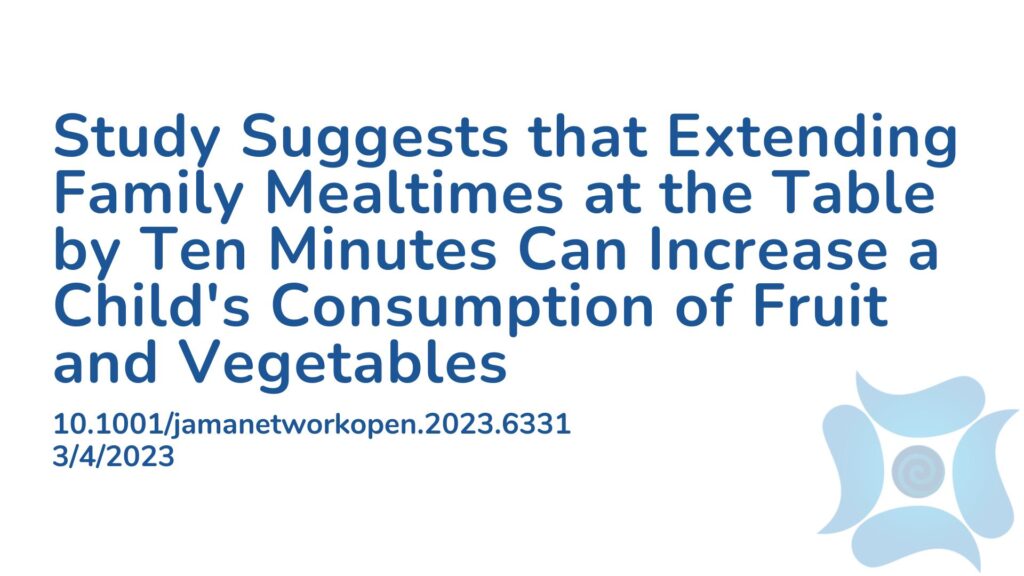Summary:
Not consuming enough dietary fibre from fruit and vegetables significantly increases the risk for non-communicable diseases, however children worldwide eat far less fruits and vegetables than required. Data shows that roughly two-thirds of a child’s calorie intake comes from meals prepared at home and are consumed in a family setting. Shared meal times amongst family are therefore an important environment in shaping the dietary patterns and preferences of children. This paper is a randomized clinical trial that examined whether extending the duration of family meals has an impact on the fruit and vegetable consumption in children. The study participants were split into groups, with one group having more time to spend with their family during mealtimes. The results were measured via the number of fruit and vegetables eating during mealtimes and showed that increasing family mealtimes by approximately 10 minutes can improve the quantity of fruit and vegetables consumed as well as a child’s overall diet.
Abstract:
Importance: Family meals are a formative learning environment that shapes children’s food choices and preferences. As such, they are an ideal setting for efforts to improve children’s nutritional health. Objective: To examine the effect of extending the duration of family meals on the fruit and vegetable intake in children. Design, Setting, and Participants: This randomized clinical trial used a within-dyad manipulation design and was conducted from November 8, 2016, to May 5, 2017, in a family meal laboratory in Berlin, Germany. Included in the trial were children aged 6 to 11 years who did not follow a special diet or have food allergies and adult parents who served as the nutritional gatekeeper in the household (ie, the family member responsible for at least half of the food planning and preparation). All participants underwent 2 conditions: control, defined as regular family mealtime duration, and intervention, defined as 50% longer mealtime duration (10 minutes longer on average). Participants were randomized to the condition they would complete first. Statistical analyses of the full sample were conducted between June 2 and October 30, 2022. Interventions: Participants had 2 free evening meals under different conditions. In the control or regular condition, each dyad ate in the same amount of time as their reported regular mealtime duration. In the intervention or longer condition, each dyad had 50% more time to eat than their reported regular mealtime duration. Main Outcomes and Measures: The primary outcome was the number of pieces of fruits and vegetables eaten by the child during a meal. Results: A total of 50 parent-child dyads participated in the trial. Parents had a mean (range) age of 43 (28-55 years) years and were predominantly mothers (36 [72%]). Children had a mean (range) age of 8 (6-11) years and included an equal number of girls and boys (25 [50%]). Children ate significantly more pieces of fruits (t49 = 2.36, P = .01; mean difference [MD], 3.32 [95% CI, 0.96 to ∞]; Cohen d = 0.33) and vegetables (t49 = 3.66, P < .001; MD, 4.05 [95% CI, 2.19 to ∞]; Cohen d = 0.52) in the longer condition than in the regular mealtime duration condition. Consumption of bread and cold cuts did not significantly differ between conditions. The children’s eating rate (bites per minute over the regular mealtime duration) was significantly lower in the longer than in the regular condition (t49 = −7.60, P < .001; MD, −0.72 [95% CI, −0.56 to ∞]; Cohen d = 1.08). Children reported significantly higher satiety after the longer condition (V = 36.5, P < .001). Conclusions and Relevance: Results of this randomized clinical trial suggest that the simple, low-threshold intervention of increasing family mealtime duration by approximately 10 minutes can improve the quality of children’s diet and eating behavior. The findings underscore the potential for such an intervention to improve public health.
Article Publication Date: 3/4/2023
DOI: 10.1001/jamanetworkopen.2023.63311000



